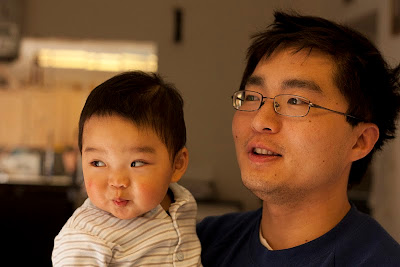Welcome to the March Carnival of Breastfeeding! You can find links to more posts on the topic of breastfeeding and race at the bottom of this one.
A Cambodian American Perspective on Breastfeeding
Whenever I am asked about my race/nationality, I tell them that I am Cambodian. Never mind the fact that I have lived in America for more than three quarters of my life and can barely make myself understood when I speak Khmer (the official language of
Cambodia). No matter how Americanize I become, my family and my looks will always declare otherwise.
When I became a breastfeeding mother, I observed the issue of race and breastfeeding with interest. In America, many mothers are asked if they will breastfeed. From my Cambodian culture, every new mother is
expected to breastfeed. Formula is still a luxury in a non-industrialized country, so women breastfeed without a second thought. Not breastfeeding would be considered unnatural.
However, because of our Americanization, many young woman from my Cambodian culture are selecting to bottlefeed instead. I have heard the following tales from within my own family:
"I did not have enough breast milk" or
"I had to go back to work." It seems that cultural expectations have changed for some newly immigrated young woman. The dominant American culture has successfully introduced formula as a viable, and sometimes desirable, substitute for breastmilk.
Despite proven generations of breastfeeding women, just the fact that being in America for no more than a few years is all that it takes for formula feeding to fast become the new normal. Even with a legion of successful breastfeeding women in their community as their resource (their mothers, grandmothers, aunts, cousins, friends, etc), the young women who immigrate to America for a better future are bottlefeeding their newborns for one reason or another. Obviously, life in America promotes bottlefeeding.
I do know that these young immigrant women do try to breastfeed first. Our Cambodian culture is one where breastfeeding is still the expected norm. However, bottlefeeding is gaining popularity. Breastfeeding, although natural, may prove challenging and formula is so readily available in America.
Although there are resources out there to help women overcome breastfeeding challenges, I have not come across any that are promoting breastfeeding among the very small percentage of ethnic minorities in America. The medical community does not reach out in any significant way to the under-serve communities of immigrant South-East Asians. This lack of cultural sensitivity when addressing breastfeeding issues with Cambodian Americans and others allow for the propagation of bottlefeeding as a norm.
Perhaps my background puts me in a different situation than some other young woman from my native culture. My American college education makes me a better advocate for myself and I am somewhat tireless about utilizing whatever resource I know of in my quest to be a breastfeeding mother. However, even I have encountered a period in my breastfeeding history where bottlefeeding looked like it was absolutely necessary. But after utilizing the resources available in my community, I quickly realized that the doubts I had about my ability to breastfeed were based on misinformation.
The community hospital outreach hotline and La Leche League warmline are wonderful breastfeeding resources. I was able to have my questions addressed by experienced professionals or breastfeeding mothers. I was able to breastfeed my son due in part to their help.
It did come to my attention that these two resources will continue to be under-utilize by Cambodian Americans due to the following factor: not one of them were staffed by anyone that wasn't a native English speaker and from what I can tell, all were white. Building trust with a breastfeeding mother is key to breastfeeding promotion. The difference in race is a stark contrast that is not easily overcome and can easily impede relationship building. Until Cambodian-American women see themselves represented in the roles of lactation consultants/educators or as an integral part of the La Leche League community, breastfeeding will be on the decline.
Lastly, Cambodians traditionally treat the post-partum mother-baby couple as a sacred unit. They practice the art of confinement. The breastfeeding mother spends the entire first month in bed with her baby. Her only priority is to care for and breastfeed her child. She is not allow to set foot out of bed for the first month. She cannot even take a shower. Plenty of special food is brought to her. Her mother/MIL/aunt/etc tends to the household needs. The husband takes over her usual duties if there are no other female to help. The mother has the time to rest, to enjoy her new role, and to build a lasting breastfeeding relationship with her newborn.
I wish for that kind treatment
for all breastfeeding mothers worldwide. Showering, perhaps, being the exception.
Sadly, the tradition of confinement is on the decline -- hardly practiced at all in America.
Here are posts you might be interested in:
Tanya:
Why we need more diversity among lactation consultants
Luschka:
Breastfeeding and Race: South Afric
Shlonda:
Breastfeeding in Ghana










